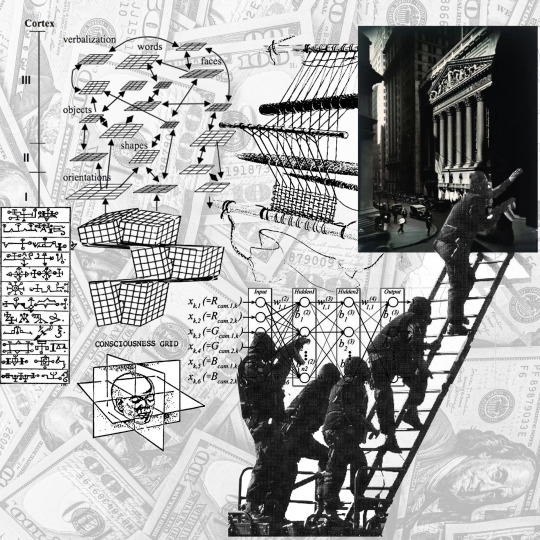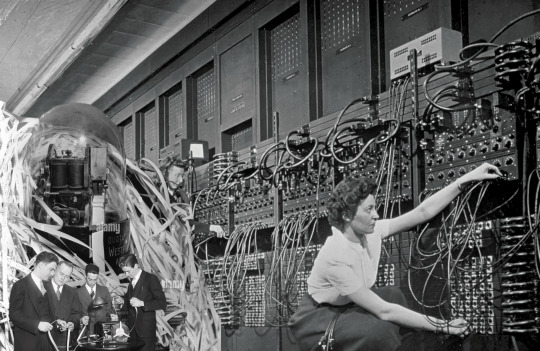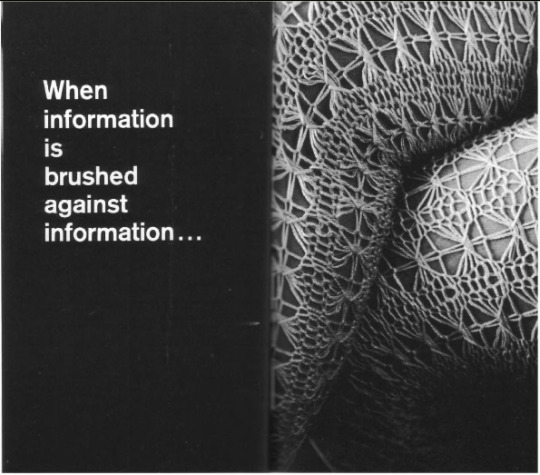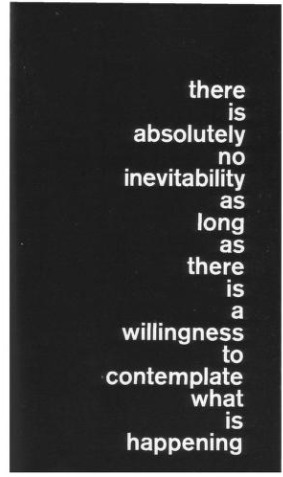#Information Theory
Explore tagged Tumblr posts
Text

Ghost in the Shell ran…
…so that Ghost in the Shell 2: Innocence could fly
2 notes
·
View notes
Text
Theseus - Life-sized magnetic mouse
Year: 1950 Creator: Claude Shannon Video: AT&T Website - (Original Bell Labs) "one of the world’s first examples of machine learning: a robotic maze-solving mouse known as Theseus. The Theseus of ancient Greek mythology navigated a minotaur’s labyrinth and escaped by following a thread he’d used to mark his path. But Shannon’s electromechanical toy was able to “remember” its path with the help of telephone relay switches.
As the film begins, Shannon’s wheeled mouse methodically explores its surroundings—a 25-square maze. Shannon tells viewers that the maze’s metal walls can be freely rearranged, so Theseus must use a small computing machine to learn the layout anew each time. But the mouse, a tiny wooden device containing a bar magnet and adorned with wire whiskers, is “far too small” to contain a computing machine, he says. Instead, the machinery is hidden beneath the floor of the maze, a series of telephone relay circuits he has repurposed to do something that they had never done before: learn." - MIT Technology Review
#ai#ai research#artificial intelligence#machine learning#claude shannon#information theory#bell labs#cybernetic#cybernetics
2 notes
·
View notes
Text
Who is Claude Shannon?
Anyone in IT will have heard of Alan Turing and Tim Berners-Lee. The majority of developers will know about Ada Lovelace. But what about Claude Shannon? Well, I have to admit that I didn’t until I had time to watch the documentary film The Bit Player. I am shocked I’d never come across Shannon’s name before, given the importance of his work. So what did he do? Well, Claude was responsible for…

View On WordPress
8 notes
·
View notes
Text
Is Evolution an Entropic Process?
The traditional view of entropy as disorder might not fully capture the relationship between life and the universe's fundamental forces. A closer look reveals a surprising relationship: evolution, the process driving the diversity and complexity of life, may itself be an entropic process.
Entropy, a key concept in thermodynamics, traditionally represents the measure of disorder in a system leading to an imagined perspective of flatness. However, from a statistical mechanics standpoint, entropy also quantifies the number of possible states a system can occupy. In this broader sense, a system with more complexity—characterized by a greater variety of components and interactions—holds the potential for more states, thereby possessing higher entropy.
Evolution through natural selection is fundamentally about changes—specifically, genetic variations that increase an organism's adaptability to its environment. Each genetic change, adaptation, or mutation that survives the harsh sieve of natural selection adds layers of complexity to life's blueprint. More complexity means more potential states and interactions, which translates to higher entropy. Thus, as species evolve and ecosystems diversify, they potentially increase the entropy of the biological system.
Evolution isn't just a genetic process; it involves significant energy and information flow changes. These transformations, as organisms become more adapted and ecosystems more intricate, lead to greater dispersal and utilization of energy. As species evolve, they explore and embody more microstates of energy distribution, suggesting that evolution might be one of nature’s pathways to maximizing entropy.
If evolution is indeed an entropic process, this provides a novel lens through which to view life's development: not merely as a fight for survival against entropy but as an integral part of the broader entropic trends of the universe. Life, in its myriad forms, isn’t just undergoing evolution; it is being driven by and facilitating the universe's intrinsic march towards higher entropy and complexity.
This perspective can reshapes understanding of the partnership between evolution and entropy. It posits life as a creation of and a dynamic participant in the universe's entropic unfolding, actively exploring new states of being and complexity. As such life could be seen as a natural consequence of entropy which includes consciousness itself.
#entropy#science#information theory#systems thinking#complex adaptive systems#complexity#physics#life#evolution
2 notes
·
View notes
Text

2 notes
·
View notes
Text

this is a very strange SF story, between cyberpunk and Thomas Pynchon
Fantasy & Science Fiction v073n05 (1987 11) (LennyS aMouse) : Free Download, Borrow, and Streaming : Internet Archive
#paul di filippo#science fiction#science fiction literature#cyberpunk#paranoia#information theory#cybernetics
2 notes
·
View notes
Text

Yes. The coveted job title: ancestor of many distinguished people.
#idk what to tag#claude shannon#information theory#Wikipedia#thomas edison#john ogden#american#inventors#scientists#dark academia#stuff#mathematics#mathblr
8 notes
·
View notes
Text
op this is everything
A non-binary robot with if/then pronouns. Is this anything
50K notes
·
View notes
Text
Join the community adventure, unlock free new applications and resources, or contribute and get your art immortalized in the ARGame. Become Immortalized | Hyper-Sanity ARGame -------------------------------------------------------------------------- TAGS: #arg #game #educaiton #vedic #gnostic #equality #free #community #outcasts
#arg#education#philosophy#vedic#anti religion#outcast#hyper-sanity#hypersanedemon#ethics#outsider#misfit#alternate reality game#alternate universe#games#riddle#solve#it#win#Gnosis#Obsidian#coding#resources#github#api#python#information theory#lgbtq positivity#satanism#atheist#pc games
1 note
·
View note
Text
#AdS/CFT Correspondence#Black Hole Information Paradox#Black Hole Physics#Cosmology#facts#Holographic Universe#Information Theory#life#Podcast#Quantum Entanglement#Quantum Gravity#Quantum Mechanics#serious#Space-Time Emergence#straight forward#String Theory#Theoretical Physics#truth#upfront#website
0 notes
Text
The Unaccountability Machine
Information Theory and The Machine of the Economy
"things went off the rails starting in about 1970 when everyone decided that the way they were going to deal with complexity was basically to ignore it and to assume that the free market would solve all the problems because people you know from Hayek onwards in the economics profession have always regarded the market as being a magic all-purpose computer..."

"it's really weird that a profession that's based on the idea that there's no such thing as a free lunch is always so happy to help itself to an informational version of exactly the same that thing ... that the market is this giant information processing and decision making machine"

"the great tragedy of our friend Hayek is that he was thinking in a very sophisticated way about information in the economy but he was doing it in the 1920s and 30s and the concept of information Theory did not exist then"
"you know all of Hayek's works on information in the economy were before Alan Turing they were before Kurt Godel... they were before Shannon you know the concept of information was not on a sound kind of rigorous mathematic basis when he was doing these things"

"unfortunately all the economists who came after Hayek presumed that information in the economy was a solved problem. It was a done deal. " "It was the Socialist calculation problem everything that was interesting to say about it had been said in 1928 and so they never really got to grips with the idea that information is a quantity and as equally as important as balancing supply and demand is the ability to balance the information generated by the environment."

"the kind of chaos and variety and variability you know of the world with the capacity of the system that's meant to be regulating and managing that environment to process it because if those if your information balance sheet isn't balancing then the system has become unregulated and then not only is it going to go out of control but also because it's unregulated you cannot assume that your actions to try to control it are going to push it back to a steady state"

"it's quite often the case that you'll be pushing it out of equilibrium and you'll be causing you know what they call what you'd recognize as oscillation if it happened in an engineering framework because you're working on a broken model of reality..."

"and you know that's kind of my diagnosis of a lot of the state that we've got to which is that we're just working on a broken or insufficient model of reality and as a result very often we're making policy interventions that are just pushing things further away from our desired State without us really knowing that we're doing that" "The way in which the economics profession ignored most of the work done in information theory is striking. It ignored its own traditions relating to uncertainty and decision-making, instead ploughing ahead with a frighteningly simplistic view of the world in which everything could be reduced to a single goal of shareholder value maximisation."
- Dan Davies - The Unaccountability Machine
youtube

#the unaccountability machine#friedrich hayek#information theory#control theory#stafford beer#norbert weiner#dan davies#management cybernetics#cybernetics#cybernetic#marshall mcluhan#Youtube
4 notes
·
View notes
Text
Information Theory
0 notes
Text
The Energy Freedom Paradox: A Mathematical Proof for ElectroDynamic Socio-Economics
Author: Diadon Acs Date: 13/9/2024 Open-Science Publication Conscious.Energy Abstract: The Energy Freedom Paradox (EFP) posits a complex interplay between energy availability, socio-economic development, individual perception, and societal well-being. This paper presents a mathematical formulation of the EFP, integrating key concepts from physics, economics, and information theory. Our model…
#Easterlin Paradox#energy freedom paradox#individual perception#information theory#Jevons Paradox#mathematical modeling#socio-economic development#well-being
0 notes
Text
Entropy transformers
What is the relationship between information, causation, and entropy? The other day, I was reading a post from Corey S. Powell on how we are all ripples of information. I found it interesting because it resonated with my own understanding of information (i.e. it flattered my biases). We both seem to see information as something active rather than passive. In my case I see it fundamentally…
0 notes
Text
transistor2tnanslator is a research group dedicated to finding solutions to problems that isolate humans.
We believe communication and ideas are two completely separate things.
We want to remove any and all barriers to connecting with another person.
Some areas of interest:
Natural Language
Accessibility
Information Theory
“Language is but a vehicle for ideas”
#science#communication#research#humans#accessibility#information theory#connection#t2t#translation#translator#computer science#cs#collab
1 note
·
View note
Text
Life does have meaning. Meaning is all around you. But there isn't a meaning of life, for at least two reasons:
(1) because there is a limit on the observable universe, and we'd need all the information to be able to extract the complete meaning - we will never have all the information; and
(2) while the meaning of life is out there, it's almost certainly just unintelligible nonsense. Like if you took the average (centroid) word out of all the words in the dictionary, it'd probably be a nonword, or at a minimum, reveal nothing interesting. Dhuidjh. K. Now what?
0 notes